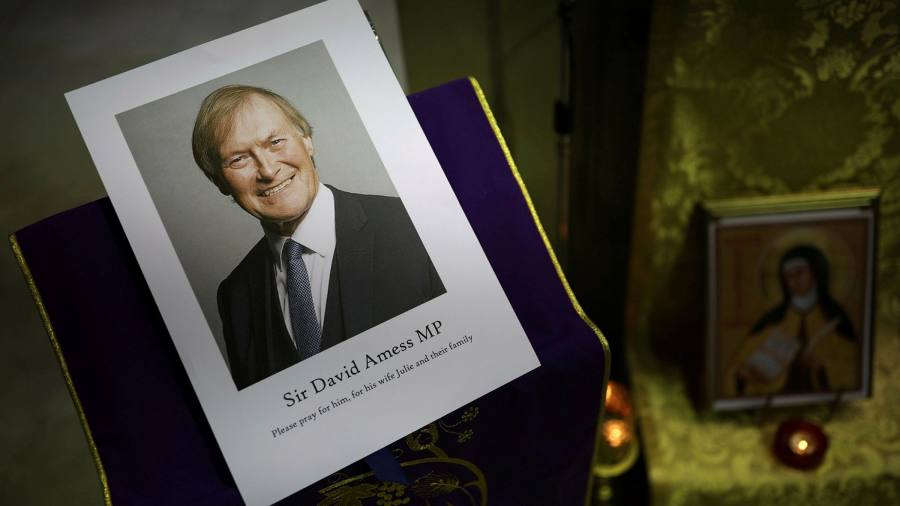UK police on Saturday were continuing to question a 25-year-old man arrested on suspicion of the murder of a leading backbench MP after the incident was declared terrorism.
The man, who Whitehall officials described as a British national of Somali origin, was arrested at the scene of the death of Sir David Amess, 69, who was meeting constituents in Leigh-on-Sea, Essex, on Friday.
“Senior national co-ordinator for counter-terrorism policing, Deputy Assistant Commissioner Dean Haydon, formally declared the incident as terrorism,” a statement from London’s Metropolitan Police said. “The early investigation has revealed a potential motivation linked to Islamist extremism.”
The force said the investigation was being led by officers from the Met’s counter-terrorism command, working closely with the Eastern Region Specialist Operations Unit and Essex Police. Officials said MI5, the domestic security service, was supporting the police investigation.
The Met said late on Friday night that searches of two addresses in London were under way, but there was no immediate indication on Saturday of where in the capital the addresses being searched were or when the next statement about the investigation would be made.
Boris Johnson, prime minister, and Sir Keir Starmer, the Labour leader, on Saturday made a joint visit to the site of Amess’ killing to lay wreaths. They were accompanied by Priti Patel, home secretary, and speaker of the House of Commons, Sir Lindsay Hoyle.
Johnson had earlier praised Amess as one of the “kindest, nicest, most gentle” people in parliament. “We’ve lost today a fine public servant and a much-loved friend and colleague,” he said, adding that Amess had “believed passionately in this country and in its future”.
The death of Amess highlighted the increasingly hostile environment that MPs have faced in recent years, including abuse on social media, and raised fresh concerns about the safety of MPs at their constituency meetings.
He was hosting a surgery for constituents at the Belfairs Methodist church in Leigh-on-Sea when a man entered the building and stabbed him several times.
He is the second parliamentarian to be killed in such circumstances in just over five years, following the stabbing of Labour’s Jo Cox in 2016 shortly before she was to hold a “surgery”, where MPs meet local people face to face to hear about their concerns.
Stephen Timms, another Labour MP, was seriously injured when he was stabbed at just such a constituency meeting in 2010. Timms paid tribute to Amess on Friday evening as a “kind and generous man”.
The home secretary said Amess’ death represented “a senseless attack on democracy itself”, adding that “questions are rightly being asked about the safety of our country’s elected representatives”.
“We cannot be cowed by any individual or any motivation . . . to stop us from functioning,” she said.
The Home Office said Patel had asked all forces to review security arrangements for MPs with immediate effect.
Hoyle said the incident would “send shockwaves across the parliamentary community and the whole country”.
“In the coming days we will need to discuss and examine MPs’ security and any measures to be taken, but for now, our thoughts and prayers are with David’s family, friends and colleagues,” he added.
Amess had himself highlighted how threats to MPs have made them less accessible to voters. In his memoir, published this year, he wrote “these increasing attacks have rather spoilt the great British tradition of the people openly meeting their elected politicians”.
Amess served as a Tory MP for almost four decades, representing Southend West since 1997.
First elected an MP in 1983 when Margaret Thatcher was the Conservative prime minister, Amess was an ardent champion for Southend-on-Sea, a large coastal town, and frequently called for it to be granted city status.
He was a pro-Brexit campaigner, a member of the Leave Means Leave pressure group and an advocate for animal welfare.
Amess was a practising Catholic and supported socially conservative values. He is survived by his wife Julia, a son and four daughters.
Praise for Amess came from across the political spectrum. Starmer said it was “a dark and shocking day” for the UK, adding: “We have, heartbreakingly, been here before.”
Jacqui Smith, a former Labour home secretary and chair of the Jo Cox Foundation set up after her murder, said: “This is a tragic loss for those who knew and loved Sir David . . . I knew him as a generous and dedicated colleague in parliament. Public life must be safe for those we ask to serve in our democracy.”
Sir Ed Davey, leader of the Liberal Democrats, described Amess’ death as “tragic and horrible” news. “A truly terrible day for British politics but most importantly of all our prayers are with all the people who loved David,” he said.
Nicola Sturgeon, Scotland’s first minister and leader of the Scottish National party, also paid tribute to Amess.
“In a democracy, politicians must be accessible and open to scrutiny, but no one deserves to have their life taken while working for and representing their constituents,” she said.
Additional reporting by Helen Warrell


